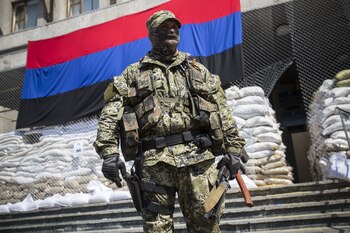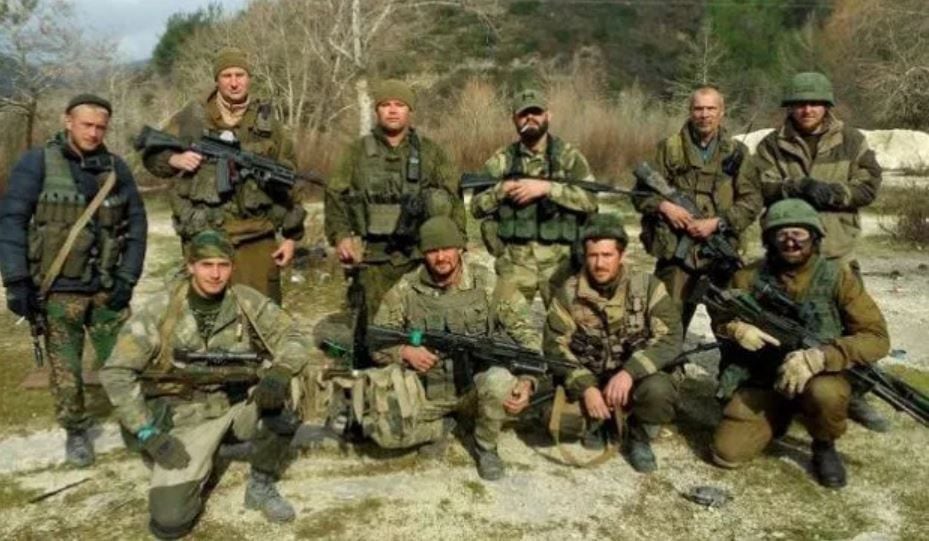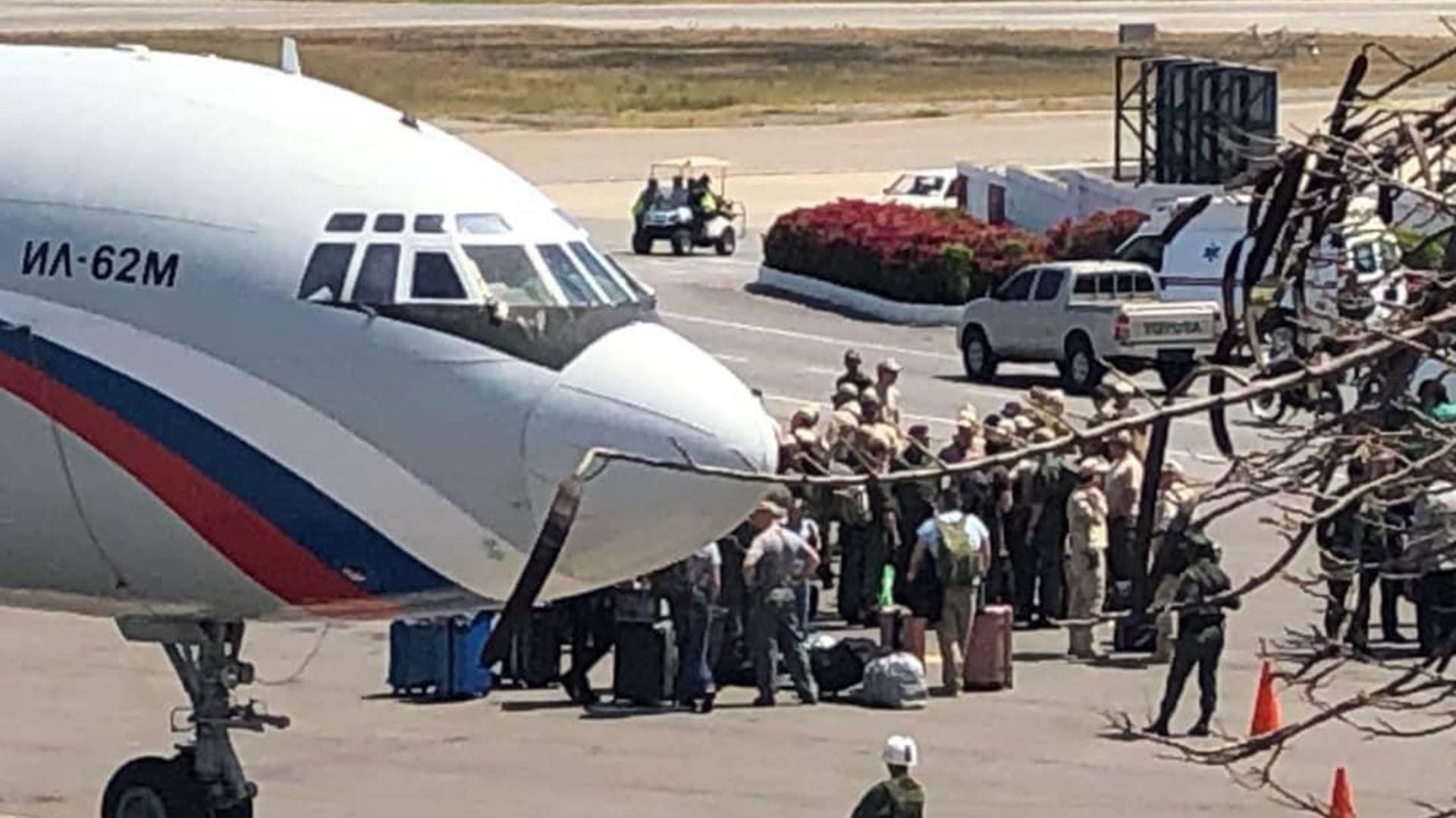
The United Kingdom announced on Thursday a new series of sanctions against 59 Russian and six Belarusian individuals and companies, due to the bloody invasion of Ukraine ordered by Vladimir Putin exactly one month ago. Among the companies are the Russian diamond giant Alrosa and the private military services group Wagner, the mercenaries in the service of the Kremlin operating in Syria, Africa and now in Ukraine.
Four days after the attack on the sovereign and neighboring country, there was a sinister plan by Moscow: to find Volodymyr Zelensky to assassinate him. The prestigious newspaper The Times was then the one that published the chilling news: the fearsome Wagner Group is in Kiev and aims to hunt down the Ukrainian president. It would be 400 mercenaries who were given the mission to assassinate the national leader in order to overthrow his government and place one that is controlled by Moscow. Today, this private group was sanctioned by London.
From the beginning of the invasion, Zelensky's government began a search for “Russian saboteurs” in the streets of the capital. They would be part of the command of the Russian oligarch Yevgeny Prigozhin, who leads the fierce and trained mercenaries. The agents are waiting for the Kremlin's order to attack, and their list of 23 targets also includes the entire cabinet, the mayor of Kiev, Vitali Klitschko, and his brother Wladimir, both former boxing champions who have become iconic figures in the Ukrainian capital's front line of defense.
Private military companies, such as the Wagner Group, have become in recent years a vital tool with which Russia expands its influence in the world while defending its interests. Currently, Russian mercenaries are present in at least 30 countries on four continents, which demonstrates the expansion of this phenomenon that took place in the conflict in Ukraine in 2014 its first trial.
Although mercenary companies are technically illegal under the Russian Constitution, the fact is that they have become a key component of Moscow's “hybrid war” strategy and offer Russian head of state Vladimir Putin a means by which” implement its political objectives and advance Russian national security interests around the world,” according to a report by the Center for Strategic and International Studies (CSIS).
In general, according to the authors of 'The Moscow Mercenary Wars', these security firms are in the hands of oligarchs close to the Kremlin, such as Prigozhin, who is very close to Putin and who is subject to sanctions by the United States.

One of its main tasks is to strengthen Russian foreign policy and expand its influence worldwide, since thanks to mercenaries Moscow is able to support certain countries or partners.
From a military point of view, given the capabilities of these mercenaries (usually former members of the security forces), allies can be strengthened, while military presence is established in settings where there was none and even disrupts the balance of power in certain conflicts “while maintains a degree of plausible denial on the part of the Kremlin”, emphasize the authors.
In addition, mercenaries are more expendable and their use is less risky than the deployment of Russian soldiers, especially if they die in combat or during training missions. Security company personnel have also become a source for collecting intelligence information, as well as being able to carry out covert actions and clandestine activities, according to CSIS.
Training supported by the Russian Army
Security contractors receive training before being sent abroad, in some cases even inside military bases and with the probable support of the Army and Intelligence services. For example, according to the report, the Wagner Group trains its men in two camps next to a base of the Intelligence Services (GRU) in Molkino, in the Krasnodar region.
On the other hand, mercenary companies and related firms in the areas of energy, mines, security and logistics also offer the Russian regime a way to “expand its trade and economic influence in developing countries and build new revenue streams, especially oil, gas and mineral extraction, to reduce the impact of sanctions”, highlights the report.
As for the tasks they perform, their main task is to train and equip the security forces of the host country or some local militia, including training in specialized combat tasks such as the use of snipers or air defense. In addition, they work to protect local authorities, even becoming the bodyguards of presidents, as is the case in the Central African Republic. Today his goal is clearer: to assassinate Zelensky.
On some occasions, according to the report, mercenaries linked to the GRU recruit human assets in addition to carrying out surveillance and reconnaissance work and carrying out political warfare, sabotage and other covert missions.
Mercenaries are also deployed to protect key energy infrastructure or mines for both host countries and Russian companies, a situation that is repeated in Venezuela. In addition, both they and the media organizations linked to their companies help spread messages in favor of Russia. In this case, the 'troll farm' owned by Prigozhin, also sanctioned by the United States, is particularly famous.
From Ukraine to Venezuela
Ukraine was the first country in which Russian mercenaries made an appearance. At present, due to the invasion, it is estimated that there may be up to 4,000 Wagner Group agents deployed throughout the territory. Four hundred of them in Kiev. Before their central role in the conflict in the Donbas region, still active, they were already present at the Russian annexation of Crimea in March 2014. According to CSIS, at the height of the conflict between the separatists and Ukrainian forces, there were between 2,500 and 5,000 Russian mercenaries.
Its role was to “destabilize and then consolidate control over Crimea and Donbas, hampering and pressuring Kiev and its Western allies to make diplomatic concessions,” all of which “deny any official Russian involvement,” emphasize the report's expert authors. Despite this, the contest has turned into a “frozen conflict” from which Russia has nevertheless been able to draw some lessons to apply in other scenarios.
Syria has been one of them. Here, Russian mercenaries have been key in propping up the regime of Bashar al-Assad and curbing the efforts of the United States and its allies. In addition, they have been crucial in the seizure of oil fields, refineries, gas plants and other infrastructure that were in the hands of the rebels.
According to CSIS, there have been as many as 1,000 to 3,000 Russian mercenaries in this country from different firms, including the Wagner Group, who have played an increasingly direct role in the Syrian regime's combat operations and often synchronized with Moscow's economic priorities. This country has also served as a testing ground for a hybrid deployment model that includes state forces and mercenaries.
In the case of Libya, the support of the mercenaries has not been for the Government recognized by the international community, but for General Khalifa Haftar, whose forces he has trained and supported in his offensive to take Tripoli. The role of the 800-1,200 mercenaries, mainly of the Wagner Group, has also included defending Russian interests in the country.
“Russia saw a power vacuum and an opportunity to exploit instability to expand Russian influence, using mercenaries to strengthen Haftar, turn the conflict in its favor and take the reward,” emphasize the report's authors. In addition, Russian mercenaries have strengthened “the geostrategic position and diplomatic influence” in Libya, which gives Russia a role in any solution to the conflict.
Russian mercenaries are also present in sub-Saharan Africa. At RCA, they have been training security forces, in addition to protecting their president, Faustin-Archange Touadéra, and mining operations. Mozambique has, however, been a failure. The Wagner Group mercenaries who came to support the government in its fight against jihadists in Cabo Delgado “had little experience in conducting forest operations and had difficulty coordinating with local forces,” according to CSIS. Arriving in September 2019, they were replaced last April by mercenaries from the South African firm Dyck Advisory Group.

In addition, Russian mercenaries have also crossed the Atlantic. Since 2017 they have been present in Venezuela, which has one of its biggest allies in Moscow, to safeguard the interests of Russia and its companies, including Rosneft. In addition, since January 2019, around a hundred of them were deployed to protect Nicolás Maduro, after Juan Guaidó proclaimed himself president in charge.
(With information from Europa Press)
KEEP READING:
Últimas Noticias
Debanhi Escobar: they secured the motel where she was found lifeless in a cistern
Members of the Specialized Prosecutor's Office in Nuevo León secured the Nueva Castilla Motel as part of the investigations into the case

The oldest person in the world died at the age of 119
Kane Tanaka lived in Japan. She was born six months earlier than George Orwell, the same year that the Wright brothers first flew, and Marie Curie became the first woman to win a Nobel Prize

Macabre find in CDMX: they left a body bagged and tied in a taxi
The body was left in the back seats of the car. It was covered with black bags and tied with industrial tape
The eagles of America will face Manchester City in a duel of legends. Here are the details
The top Mexican football champion will play a match with Pep Guardiola's squad in the Lone Star Cup

Why is it good to bring dogs out to know the world when they are puppies
A so-called protection against the spread of diseases threatens the integral development of dogs




